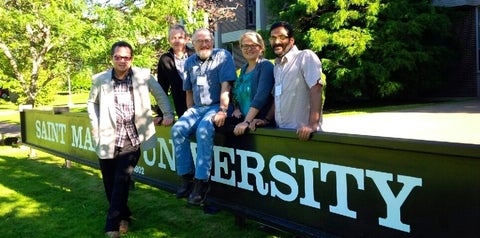What motivates conservation stewardship? What are the ingredients of a successful community conservation approach? And, how can communities work more effectively with partners to achieve both conservation and sustainable livelihood goals? Last month, members of the ECGG attended a meeting of the Community Conservation Research Network (CCRN), which has been conceived specifically to grapple with these questions.
Hosted at Saint Mary’s University in Halifax, Canada, the SSHRC-funded CCRN is an international partnership of university researchers, aboriginal and government organizations, community partners, and non-government organizations that have come together to explore linkages between communities and conservation around the world. Network activities aspire to leverage expertise and experiences to generate new thinking and improved practices on how communities initiate and participate in environmental conservation and stewardship. Drawing on eleven case studies from across the globe – including sites in Mexico, South Africa, Indonesia, Nova Scotia, British Columbia and elsewhere – this network provides a unique opportunity to foster synergies and novel collaborations.

CCRN members out and about at Saint Mary’s University, Halifax (L to R: Dr. Arif Satria, Dr. Derek Armitage, Dr. Fikret Berkes, Ms. Samantha Berdej, Dr. Prateep Nayak)
While attending the weeklong meeting, I witnessed firsthand the breadth of the ambitious project – squeezing in nearly twenty-five presentations, four working group sessions, and a handful of planning meetings. Coffee breaks and lunches were overtaken by vibrant discussions of conservation challenges, the need to bridge science and policy, and talk of novel methodologies and partnerships. It certainly was an energizing week! Of notable interest were presentations by Dr. Seixas on reconciling protected areas and livelihoods in the Paraty region on the southern coast of Brazil, and by Dr. Loucks on social-ecological regime shift and transformation in Clayoquot Sound, British Columbia. Resident ECGG member Dr. Nayak introduced a social justice dimension to the discussion through his presentation on marginalization, power, and livelihoods in the Chilika Lagoon, India.
Our very own Dr. Derek Armitage – and founding partner to the CCRN – co-chaired a productive meeting of the Governance Working Group (GWG), of which I am a member. While the types of governance arrangements can vary significantly place to place, this Working Group is interested in determining the ‘ingredients’ of arrangements that promote conservation initiatives/practices to sustain human well-being and ecosystem services. In doing so, the GWG grapples with issues of scale, fit, equitable decision-making and community involvement, among others. One of the GWG’s short-term outcomes is the development of a ‘governance framing document’ through which to capture key features and concepts, synthesize learned lessons in governance, and identify methodological issues and opportunities – stay tuned!
While in Halifax, I too had the pleasure of presenting my ongoing research to the CCRN on the human dimensions of conservation in Bali, Indonesia. Coastal-marine areas are one important setting in which to explore linkages between communities and conservation, both because of the growth of marine-dependent populations along the world’s coastlines, and because of the diversity of interests, values, and views overlain on these spaces. By identifying and critically examining bridging organizations, i.e. independent agencies that facilitate multiparty collaboration, it is my intent to impart insights of their contributing role in linking and enabling collaboration across social dimensions and organizational levels (from local to regional). Emphasizing a social-ecological systems approach, the CCRN is a critical supporter of this work by connecting me to an extensive network of researchers, analysts, and resources. Together, these provide me with valuable feedback and mentoring, helping to negotiate the challenges associated with undertaking research on communities and conservation abroad. Moreover, the CCRN provides a sound intellectual context in which to investigate and facilitate my own research.
While the CCRN is in it’s early days, this meeting has made evident that there are many exciting things yet to come. Overall, it was an incredibly energizing and insightful week. Many thanks to Tony Charles and John Abraham for their hard work in orchestrating the week’s affairs!